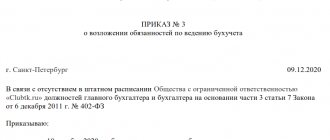What to do in connection with the introduction of the new Professional Standard?
The rules of the new professional standard for accountants, in fact, will not require any action from private capital companies - they form salaries and positions based on their own requirements and financial realities.
Enterprises and institutions that apply the professional standard (Article 195.3 of the Labor Code of the Russian Federation), in connection with innovations, must analyze and harmonize the professional competencies of existing specialists, and formulate a plan for retraining accountants and obtaining additional professional education for them to obtain the appropriate category.
Is it possible to do without a job description?
Many employers are wondering whether it is possible to do without drawing up job descriptions for an accountant and other employees of the enterprise.
Since the current labor legislation does not contain rules obliging the preparation of these documents, private Russian enterprises can easily function without them. In such cases, along with the labor function, the specific range of job responsibilities of the accountant and his labor rights are listed directly in the employment contract, which is signed with him upon employment.
Important! Drawing up job descriptions remains mandatory only for government agencies, which directly follows from Art. 47 of Law No. 79-FZ of July 27, 2004. The absence of a job description for an employee of a budgetary institution is a reason for the application of sanctions by regulatory authorities.
At the same time, inspection bodies cannot fine a private organization for lack of job descriptions. The corresponding clarification can be found in the letter of Rostrud No. 3042-6-0 dated 08/09/2007.
Despite the absence of penalties, experts recommend not to refuse to draw up a job description for an accountant and other specialists on the company’s staff for a number of important reasons.
In particular, with the help of a job description you can:
- justify the termination of employment relations with the chief accountant, for example, by his inadequacy for his position;
- prove the legality of the disciplinary punishment imposed on the employee;
- delineate responsibilities between accountants if there are several of them in the organization;
- refuse to hire job applicants who, for a number of reasons, are not suitable for the position of accountant.
Thus , according to Art. 8 of the Labor Code of the Russian Federation, the management of the enterprise has the right to approve local regulations. Since the Labor Code of the Russian Federation does not contain a norm obliging the adoption of a job description, the employer can draw it up based solely on the internal acts of the organization.
How are assigned categories regulated?
The assignment of qualification categories to accounting specialists is regulated by the Professional Standard, approved by Order of the Ministry of Labor of the Russian Federation No. 103n dated February 21, 2019, which introduced a new professional standard for accountants, and which must be followed when certifying employees for category assignment.
The norms of the Professional Standard establish which category an accountant belongs to, taking into account two main evaluation criteria - the specialist’s level of education and work experience in the profession.
Related article: Rules for the application of professional standards Read more
Accountant: categories, qualification requirements, main aspects of the new professional standard
The new professional standard uses the division of the labor functions of accountants into five groups:
- Group “A”: accounting – ordinary specialists (accountants with and without categories, qualification level 5);
- Group “B”: preparation of reporting (accounting, financial) - chief accountants and heads of accounting departments (skill level 6);
- Group “C”: reporting - chief accountants working in enterprises with branches (skill level 7);
- Group “D”: preparation of consolidated statements – specialists preparing consolidated statements (skill level 8);
- Group “E”: provision of accounting and reporting services – accounting consultants (qualification level 8).
According to the new Professional Standard, accounting specialists received the following job titles:
- Accountant - specialists with secondary vocational education, or non-core secondary education and additional vocational education (according to professional retraining programs);
- Accountant of the 2nd category are specialists with a similar level of education and experience in the position of “accountant” for at least one year;
- Accountant of the 1st category are specialists who have worked for at least 1 year in the position of “accountant of the 2nd category” and have the above level of education.
It should be noted that in the new Professional Standard, which defines the categories of accountants, the “leading accountant” is not designated as a specialist in the field of accounting. Enterprises that are guided by the new professional standard in their work should bring their staffing schedule and categories of specialists into line with it.
To figure out which accountant belongs to category 1, 2 or does not have one, you should analyze section II of the professional standard “Description of labor functions” and section 3.1 “Generalized labor function”, which details the types of work and requirements for qualifications and level of education for specialists specific categories.
According to the level of qualification, the chief accountant belongs to the sixth, seventh, and eighth categories, and there are no categories for him by analogy with ordinary accountants (first, second, etc.).
The use of professional standards, and therefore categorization for accountants, is advisory in nature, which gives business entities the right to independently decide whether to use such a professional gradation of specialists or not.
RESPONSIBILITIES
This section lists responsibilities in alphabetical order rather than in order of importance. Select from the list provided those statements that correspond to your experience, taking into account the industry of the company in which you have worked or continue to work.
• Analysis and preparation of management reporting. • Analysis of financial statements in accordance with procedures for closing the reporting period. • Archiving of implementation documents. • Conducting banking operations. • Maintaining an accounting archive. • Maintaining accounting and tax records of the 1st legal entity on OSNO. • Maintaining accounting and tax records. • Maintaining accounting records for settlements with customers using online cash registers. • Maintaining accounting records of business transactions regarding cash flow. • Maintaining accounting records, drawing up and presenting financial statements in accordance with IFRS, RAS standards and the requirements of the financial controls of the Group of Companies. • Maintaining all areas of accounting for 5 legal entities. • Conducting import operations. • Conducting personnel records. • Maintaining personnel records. Payroll calculation and accrual (35 people). • Maintaining cash documents, current account transactions. • Maintaining tax registers in order to form the tax base for income tax. • Maintaining records of the provision for doubtful debts. • Interaction and reconciliation with tax authorities. • Interaction with the tax inspectorate to provide documents for desk (in terms of VAT) and counter audits. • Interaction with tax authorities, reconciliations, responses to requirements. • Mutual settlements and reconciliations with customs authorities regarding payment orders/write-offs. • Internal audit, tax optimization. • VAT refund on export transactions. • Issuing and checking invoices for payment of penalties under leasing agreements. • Consolidation and preparation of accounting/tax reporting. • Control of accounting and tax accounting of branches. • Control over the maintenance of all areas of accounting and tax accounting. • Monitoring the compliance of source documents with legal requirements in terms of eliminating the risk of non-acceptance of VAT for deduction. • Control and analysis of the formation of turnover on accounts 19, 68, purchase books and sales books. • Control of inventories of fixed and cash assets, inventory items. • Control of the availability and execution of incoming documents, return of primary documents, contracts. • Control of tax payments. • Control of the reflection of movement in accounting accounts (absence of unconfirmed transactions). • Monitoring the recording of business transactions for legality of acceptance for tax accounting purposes. • Control of audits of accounting and reporting. • Control of wage fund expenditure. • Monitoring the results of the company’s financial and economic activities, execution of cost estimates, financial, settlement and credit transactions and timely recording of transactions in accounts. • Monitoring compliance with cash discipline. • Monitoring compliance with the procedure for processing and returning accounting documents. • Monitoring compliance with deadlines for uploading data from 1C UT to BP. • Control of accounting transactions with deposit and loan agreements. • Control functions during monthly closure of the accounting database, generation and verification of VAT returns. • Calculation of interest on loans and borrowings. • Organization of management accounting (Cash-flow, P&L). • Preparation of advance reports. • Preparation of accounting and tax reporting, UTII declaration, transport tax, property tax, reporting to statistics, preparation of documents for banks. • Preparation of documents for audit and tax inspections regarding VAT. • Preparation of documents for counter inspections. • Preparation and submission of accounting and tax reporting (OSNO). • Preparation and submission of accounting, tax and statistical reporting in full. • Full maintenance of accounting and tax records, submission of accounting, tax and management reporting for Groups of companies and individual entrepreneurs. • Representation of the company's interests in government regulatory organizations. • Representation of the company's interests in the Federal Tax Service. • Reception of documents from service providers and processing in the 1C database. • Conducting a daily inventory of balances on accounting accounts 51, 52. • Conducting a monthly inventory of work in progress and finished products. Registration and recording of inventory results. • Production, distribution of input VAT + indirect costs. • Passing inspections by regulatory authorities. • Working with the bank: processing payments, client/bank, generating statements and certificates; synchronization with 1C; control over the fulfillment of bank requirements. • Work with the bank on currency control, preparation of transaction passports, certificates of currency transactions. • Working with accounts receivable and payable, monitoring payment deadlines, preparing reconciliations with counterparties and confirming mutual settlements. • Work with primary accounting documentation (receipt and sale) in 1 C: 8.3. • Calculation and accrual of wages, calculation of vacation pay, calculation of taxes from payroll. • Calculation and accrual of penalties provided for in the leasing agreement. • Calculation of value added tax, including transactions at a 0% VAT rate. • Calculation of interest on loans and borrowings. • Payments to suppliers: reflected in the program, control over the correct execution of incoming documents. • Settlements with suppliers and contractors for services rendered. Reflection of business transactions on accounting accounts. • Reconciliation with tax and funds, preparation of documents for on-site and desk audits, maintaining bank and cash desk operations, accounting for fixed assets and materials. • Reconciliations with counterparties. • Submitting reports to the Pension Fund and the Social Insurance Fund. • Participation in the preparation of tender documentation. • Participation in conducting inventories of warehouse operations. • Participation in the preparation of tax, financial reporting, reports on the movement of funds on accounts (deposits) in banks outside the Russian Federation. • Participation in the formation of accounting policies in accordance with accounting legislation. • Accounting for excise taxes, generating and submitting reports on excise taxes to the tax authorities. • Accounting for finished products, work in progress, generation of a monthly production report. • Accounting for business expenses. • Accounting for leasing operations. • Accounting for inventory, settlements with suppliers of basic raw materials and packaging, incl. on import. • Accounting for transportation costs for the delivery of finished products. • Formation of acts, carrying out reconciliations of shipments and payments. • Formation of financial statements according to RAS. • Formation of tax returns for value added tax and tax registers (books of sales and purchases, journals of invoices). • Formation of a cash flow report. • Formation of cost (production costs and imported goods).
Categories of accountants according to the Qualification Directory
Currently, public sector enterprises assign an accountant category in accordance with the Qualification Directory of Positions, approved. Resolution of the Ministry of Labor of Russia dated August 21, 1998 No. (as amended on March 27, 2018). For commercial organizations, the directory is advisory in nature. In the future, it is planned to gradually transition the public sector to the use of professional and industry standards, but this is a rather lengthy process.
According to the Qualification Handbook, in order to assign specialists the levels of “accountant”, “accountant of categories 1 and 2”, the following requirements must be met:
- Accountant - specialists with secondary vocational education (in an economic profile), without work experience requirements or with special training in accounting programs and at least 3 years of work experience in the field of accounting and control;
- Accountant of the 2nd category are specialists with a higher professional (economic) education, without requirements for work experience in their specialty, or secondary vocational education with at least 3 years of work experience in the position of “accountant”;
- Accountant of the 1st category are specialists with higher professional education (economics) and work experience of at least 3 years in the position of “accountant of the 2nd category”.
Evaluation criteria for accountant certification
In order to determine the categories of budget accountants during certification, the following criteria are taken into account:
- the specialist has a specialized education;
- availability of specific practical skills;
- the work experience of the person being certified as an accountant;
- qualification characteristics regulated by the reference book.
Moreover, the requirements for education, skills and job responsibilities are provided for by the Unified Standards for the positions of managers, specialists and employees, approved by Resolution of the Ministry of Labor of the Russian Federation No. 37 of 08/21/1998 (as amended on 03/27/2018), wages for the assigned categories are established by the employer, and depend from the approved standards in a particular enterprise (institution).
Job description structure
The current regulations do not have a unified form of job description. That is why the instructions, like the forms of most other documents, are developed by officials independently, after which they are approved by management.
The contents of the instructions should reflect standard information:
- name of the organization in which the employee is registered;
- information about the manager: full name, position;
- Date of preparation;
- document's name;
- general provisions;
- job responsibilities of an accountant;
- employee labor rights;
- responsibility;
- qualification requirements;
- manager's signature;
- signatures of other officials with whom the document is being agreed upon, for example, the head of a structural unit;
- introductory signature of the employee appointed to the position of accountant and date.
Accountant: qualification categories and remuneration
Why do you need to determine which category a specialist belongs to? Exclusively in order to correctly, in accordance with current legislation, set the specialist’s wages.
Institutions with budgetary funding, as specified in Art. 144 of the Labor Code of the Russian Federation, they cannot charge wages below base rates and salaries established in accordance with the professional categories assigned to employees. Thus, in order to calculate an accountant’s salary, the calculations must be based on the qualification level assigned to him.
Let us note an important point that specialists often encounter in labor practice.
If an accountant has previously been assigned the level of “Accountant of the 1st category”, the requirements for education and experience are confirmed by entries in the work book and a diploma; when subsequently employed in budgetary enterprises, for which the categorization system is mandatory, the specialist is accepted with this category. Downgrading of a category is allowed only based on the results of certification and after an appropriate decision has been made by the certification commission, documented. You can find more complete information on the topic in ConsultantPlus. Free trial access to the system for 2 days.





